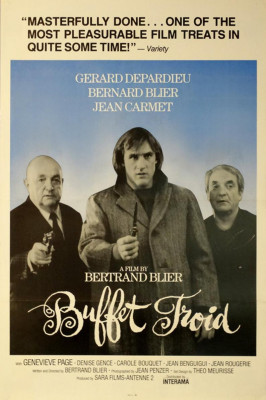| Reviews & Columns |
|
Reviews DVD TV on DVD Blu-ray 4K UHD International DVDs In Theaters Reviews by Studio Video Games Features Collector Series DVDs Easter Egg Database Interviews DVD Talk Radio Feature Articles Columns Anime Talk DVD Savant Horror DVDs The M.O.D. Squad Art House HD Talk Silent DVD
|
DVD Talk Forum |
|
|
| Resources |
|
DVD Price Search Customer Service #'s RCE Info Links |
|
Columns
|
|
|
Buffet froid
The story opens in the lower depths of the Paris Metro, where an accountant (Michel Serrault) is approached by Alphonse Tram (Gérard Depardieu), an unemployed philosopher who at first annoys and then frightens him with talk of a killing a random stranger with a switchblade just like the one he carries. Tram, trying to calm the man, discards the knife on a seat nearby, but the knife vanishes moments later, perhaps taken by another commuter. The accountant boards a train, partly fleeing Tram. Later, as Tram leaves the subway, passing several sleeping homeless men, he notices the accountant also lying nearby, fatally stabbed in the stomach with Tram's knife. The accountant, surprisingly unperturbed, gives the knife back to Tram, along with all the cash in his wallet. He won't be needing it, after all.
Tram returns home to his high-rise apartment building, though he and his wife, Josyane (Liliane Rovère?) are its only tenants. Tram tells the wife that he may or may not have murdered a man, but this does not seem to bother her at all. "Want more fish?" she asks. She informs him that a new tenant has just moved in a few floors above. Finally, a neighbor, Tram seems to react. As it turns out, Morvandieu (Bernard Blier, father of director Bertrand Blier) is a police inspector, so Tram confesses his Metro story to him. He pours Tram some wine.
Soon after, Tram returns home to find his wife not there. Later, worried, he tells Inspector Morvandieu, who puts a call in and, sure enough, the wife has been murdered, her body abandoned in an empty lot. Still later, the mild-mannered murderer (Jean Carmet) turns up at Tram's door looking, apparently, for souvenirs of the woman. This does not bother Tram, who offers him some food and wine.
And so it goes.
Early scenes create an interesting atmosphere, of a deserted Paris subway, of deserted concrete and glass-dominated Paris streets, of an apartment complex where no one but the Trams (and, later, Morvandieu) live. Later in the picture, the story's characters are similarly isolated in the countryside, where they encounter "the young woman at the end," played by Carole Bouquet, soon to be cast opposite Roger Moore in For Your Eyes Only (1981). She's lovely to look at, even when you've given up on the movie.
Depardieu and the rest of the cast all give strong performances, in a way making Buffet froid all the more frustrating. Geneviève Page, who did a few American films including Anthony Mann's El Cid (1961) Billy Wilder's The Private Life of Sherlock Holmes (1970), is also good, playing a sex-starved middle-aged woman. Bald, round-faced Bernard Blier, one of the great character actors of French cinema, is similarly marvelous. (His appearance recalls one of his earlier roles, in Les tontons flinguers (1963), an offbeat gangster film with a similar tone. Like Buffet froid, it was not a hit but has since garnered a cult status.)
But the point is what, exactly? I found its deadpan black humor amusing to a point, and visually it's as interesting as its acting, but it doesn't seem to be leading anywhere, which may be okay, but what, pray, is it trying to express? That modern, utilitarian French society is oppressive and dehumanizing? That we cling to purpose when there is none? Beats me.
Video & Audio
Licensed from Studio Canal, Buffet froid is another excellent transfer and welcome release from Kino, frustrating though I did find it. Presented in 1.66:1 widescreen with DTS-HD Master Audio (mono), French only with English subtitles, with the disc region "A" encoded.
Extra Features
Supplements include an unenlightening archival interview with director Bertrand Blier; an audio commentary track with film critic Nick Pinkerton; and a booklet essay by film critic Gavin Smith, they appreciating the film more than I was able to.
Parting Thoughts
As noted above, your mileage may vary. Perhaps in the right mood I might have found Buffet froid as wonderful and hilarious as so many reviewers on the Internet Movie Database apparently did. I liked it visually, and for the acting, and enthusiastically stayed with the film for a long while, but eventually found it more than a little wearying. Still, for the adventurous, Recommended.
Stuart Galbraith IV is the Kyoto-based film historian currently restoring a 200-year-old Japanese farmhouse.
|
| Popular Reviews |
| Sponsored Links |
|
|
| Sponsored Links |
|
|
| Release List | Reviews | Shop | Newsletter | Forum | DVD Giveaways | Blu-Ray | Advertise |
|
Copyright 2024 DVDTalk.com All Rights Reserved. Legal Info, Privacy Policy, Terms of Use,
Manage Preferences,
Your Privacy Choices | |||||||















